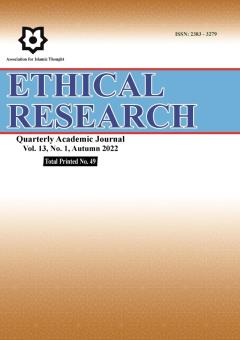Psychological research of the spiritual education of the Islamic way of life
Subject Areas : اخلاق و تربیت اسلامیseed mohamad noorollahi 1 , Mohammad Ali Rezaei Isfahani 2 * , mahmud ghayumzadeh 3
1 -
2 -
3 -
Keywords: lifestyle, religion, spiritual education, Quran, narrations.,
Abstract :
Islam and the Qur'an have been able to show the greatest impact on the way human beings live by presenting insights, knowledge, values, norms, feelings and social patterns. The last heavenly religion has shown a solution for all internal and external needs and guides human beings to their destination by offering various behavioral patterns. Modern lifestyle patterns, in spite of the opportunities and possibilities that they have provided to human beings and have dealt with material and worldly issues, have also brought about many diseases and injuries. Islam, as the last and supreme divine religion, provides balanced and comprehensive models and models for human beings so that they can achieve worldly and otherworldly happiness while getting rid of threats and harms. Religion can affect a person's lifestyle in different ways; Religion contains the main knowledge, insights and attitudes that play a role in shaping human life. Gives theology the original knowledge and attitudes about God, the other world, and man so that he can have clear images of the world around him and himself. The purpose of this study is that the principles and topics of the Islamic lifestyle that leads man to a good life and finds happiness and righteousness and reaches worldly and otherworldly happiness has used verses and hadiths and explains patterns and methods. That we can implement it in our lives and grow faster to reach our destination.
قرآن کريم
ابن حجاج قشیری نیشابوری، مسلم، (1415ق)، صحيح مسلم، بیروت، دار الکتب علمیه، 3/1456/14.
ابن حسام الدین هندی، علاءالدین علی المتقی، (1415ق)، كنز العمّال، بیروت، دار الکتب العلمیه، : 15991.
امینی، ابراهیم، اسلام و تربیت، انتشارات انجمن اولیاء و مربیان، جلد 1، چاپ اول، ص ۱۴.
آذرشب، معصومه و میرمرادی، عیسی، (۱۳۹۳)، شاخصههای سبک زندگی اسلامی، مجموعه مقالات اولین کنفرانس ملی تحقیق و توسعه در هزاره سوم دانشگاه آزاد اسلامی واحد علی آباد کتول، ص۱ -۱۲.
تحف العقول، الحسن الحرانی (ابن متعبه الحرانی).
حسینی، سید حسین، (1363)، تحفة الاخیار فی ترجمة جامع الأخبار، قم، چاپ اول، انتشارات امام صادق (ع).
خامنهای، سیدعلی، (1397)، طرح کلی اندیشه اسلامی در قرآن، چاپ پانزدهم، چاپ سلمان فارسی، انتشارات مژسسه ایمان جهادی، ص 577.
رضايي اصفهاني، محمد علي، (1396)، سبک زندگي قرآني(1) مباني و اصول عام سبک زندگي، قم، دفتر نشر معارف ،ص 38.
شکوهی یکتا، محسن، (1367)، تعلیم و تربیت اسلامی (مبانی و روشها)، تهران، شرکت چاپ و نشر ایران، ص 13.
شهید ثانی، منیة المرید فی آداب المفید و المستفید، انتشارات علمیه اسلامی.
عارفيجو، مهدي، نقش و جایگاه زینت و تجمل در سبک زندگی اسلامی، (شماره ديجيتال 10408) مرکز تحقيقات رايانهاي قائميه اصفهان.
علامه مجلسی، بحار الأنوار الجامعة لدرر أخبار الأئمة الأطهار، ناشر اسلاميه، چاپ تهران، سال چاپ: مختلف، نوبت چاپ: مكرر، ج68 ، ص 329.
عمید، حسن، (1362)، فرهنگ فارسی عمید، انتشارات امیرکبیر، ص ۳۱۱.
فایضی، علی، آشتیانی، محسن، (1375)، مبانی تربیت و اخلاق اسلامی، چاپ اول، قم، چاپ دانش، انتشارات روحانی.
فعالي، محمد تقي، (1396)، مباني سبک زندگي اسلامي، مؤسسه دين و معنويت آل یاسين، قم.
کافی، مجید، (1397)، سبک زندگی اجتماعی با تأکید بر آیات قرآن، چاپ اول، قم، ص 12.
کاویانی، محمد، (1396)، سبک زندگی خانوادگی از دیدگاه قرآن و مدرنیته، مجله تربیت اسلامی، شماره 24.
کلینی، محمد بن یعقوب، اصول کافی، ج 1، ص 266، باب التفویض الی رسول الله حدیث 4.
الكافي (دارالكتب الاسلاميه) ج 1، ص 58، ح 19.
معین، محمد، (1371)، فرهنگ فارسی معین، تهران مؤسسه انتشارات امیرکبیر، هشتم.
المنجد الا بجدی، چاپ احمدی، انتشارات فقیه، تهران، ص ۲۴۴

